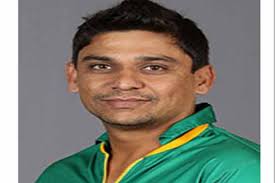By Muhammad Luqman
Pakistan Cricket Board has banned batsman Khalid Latif from all forms of cricket for five years for his role in the spot-fixing scandal.
Latif, playing for Islamabad United, was charged with six major breaches of the PCB’s anti-corruption code and was found guilty of all six on Wednesday. He was also fined with Rs 1 million Pakistan (USD 9489).
Latif’s lawyer Badar Alam, who has raised several objections throughout the proceedings of his client, did not show up to hear the verdict being announced. Alam had refused to turn up for several hearings during proceedings as well, and had registered a case against the formation of the tribunal set up to adjudicate on Latif’s case. Both parties have a right to appeal the judgment within 14 days of receiving the detailed decision, which has not been released yet. While PCB’s lawyer Taffazul Rizvi said the PCB would wait and see whether to lodge an appeal, the discontent of Alam suggests an appeal on his client’s part would be likely – where that appeal is lodged and whether it is outside the PCB’s remit is also not yet known.
Unlike Sharjeel Khan, who was banned for 5 years on August 30 for spot-fixing charges emanating from the same match at the PSL, none of Latif’s sentence is suspended, meaning the 31-year old cannot return to cricket till at least 2022. It is the harshest punishment meted out so far to a player involved in the PSL spot-fixing saga. Mohammad Irfan and Mohammad Nawaz were also banned, for the relatively lesser indiscretions of failure to report corrupt approaches. Both have since returned to domestic cricket. A veteran on the domestic circuit – Khalid Latif made his debut 17 years ago when he was just 14. He has never been able to make the grade at international level. He was called up to the ODI side in 2008, but played just five games over two years. He hasn’t been able to find much more consistency in T20Is, playing 13 over an eight-year period, the last against the West Indies in a home series in 2016. This ban, should it not be reduced or overturned in the event of an appeal, would almost certainly spell the end of Latif’s international days, and given his age – Latif will be 36 when the ban ends – make even returning to the domestic circuit a daunting challenge.















